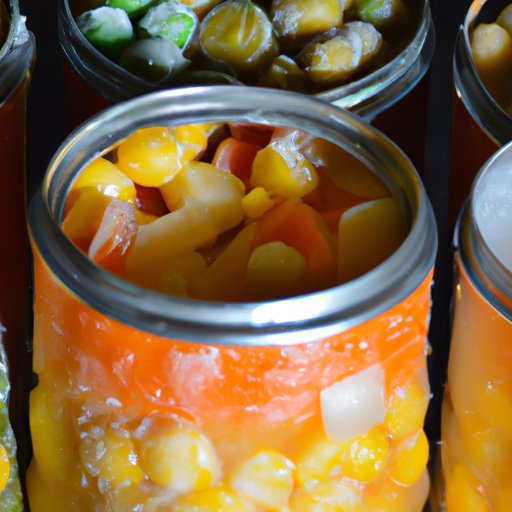Introduction
Eating a diet rich in vegetables is essential for good health. But what if you don’t have access to fresh vegetables or don’t have time to prepare them? Canned vegetables may be the answer. Canned vegetables are convenient, affordable, and readily available year-round. But are they healthy? In this article, we’ll explore the benefits and drawbacks of eating canned vegetables so you can make an informed decision.
Exploring the Health Benefits of Eating Canned Vegetables
Canned vegetables can be a great way to get more vegetables into your diet. Here’s a look at some of the main benefits:
Nutritional Value
Canned vegetables contain many of the same nutrients as fresh vegetables, including vitamins, minerals, and antioxidants. According to a study published in the journal Nutrients, “The results showed that the levels of most vitamins and minerals were similar between fresh and canned vegetables.”
Cost Savings
Canned vegetables are usually much less expensive than fresh vegetables. This makes them a great choice for those on a budget. A study published in the journal Food Science & Nutrition found that “canned vegetables are often more economical than their fresh counterparts.”
Convenience
Canned vegetables are quick and easy to prepare. They come pre-cut and pre-washed, so all you have to do is open the can and heat them up. This makes them a great option when you’re short on time.
A Nutritionist’s Guide to Eating Canned Vegetables
If you decide to include canned vegetables in your diet, here are some tips from nutritionists to help you make the healthiest choices:
Selecting the Right Canned Veggies
When selecting canned vegetables, choose ones with no added salt, sugar, or other additives. You should also look for ones that are packed in water or low-sodium broth.
Reading Labels
Be sure to read the label to check for added sodium, sugars, and other ingredients. It’s also important to check the expiration date to ensure the product is still safe to eat.
Stocking Your Pantry
When stocking your pantry with canned vegetables, it’s best to choose a variety of colors and types. This will help ensure you get a wide range of vitamins, minerals, and other nutrients.
Are Canned Veggies as Nutritious as Fresh?
Many people wonder if canned vegetables are as nutritious as fresh. Here’s a look at some of the key nutrients:
Vitamins and Minerals
Canned vegetables are a good source of vitamins and minerals, such as vitamin A, vitamin C, calcium, and iron. According to a study published in the journal Nutrition Research, “The levels of most vitamins and minerals were similar between fresh and canned vegetables.”
Antioxidants
Canned vegetables are also a good source of antioxidants, which can help protect against disease. A study published in the journal Nutrition Research found that “the antioxidant content of canned vegetables was generally higher than that of fresh vegetables.”
Taste and Texture
Canned vegetables may not have the same taste and texture as fresh vegetables, but they can still be delicious. To improve the taste and texture, try adding herbs and spices or sautéing them in a little oil.

How to Choose Healthy Canned Vegetables
When shopping for canned vegetables, here are some tips for choosing the healthiest options:
Avoid Added Sodium
Look for canned vegetables that are labeled “no salt added” or “low sodium.” Also, avoid canned vegetables that are packed in salted water or high-sodium sauces.
Look for Low-Calorie Options
Choose canned vegetables that are labeled “low calorie” or “reduced calorie.” These tend to be lower in fat and calories.
Check for Added Sugars
Some canned vegetables contain added sugars, so be sure to check the label. Avoid canned vegetables that have added syrups or sweeteners.

The Pros and Cons of Eating Canned Vegetables
Eating canned vegetables has both pros and cons. Here’s a look at some of the key points:
Pros
- Nutrient-rich
- Affordable
- Convenient
- Available year-round
Cons
- May contain added sodium, sugars, and other additives
- May not have the same taste and texture as fresh vegetables
Is Eating Canned Vegetables Better Than Eating Frozen?
It’s a common misconception that canned vegetables are healthier than frozen. However, both types offer similar nutritional benefits. Here’s a look at some of the key differences:
Nutritional Value
Both canned and frozen vegetables are good sources of vitamins, minerals, and antioxidants. The only difference is that canned vegetables may contain added sodium, sugars, and other additives.
Cost
Canned vegetables are usually less expensive than frozen. This makes them a great choice for those on a budget.
Convenience
Canned vegetables are more convenient than frozen because they come pre-cut and pre-washed. Frozen vegetables require more preparation time.
Conclusion
Canned vegetables can be a nutritious, convenient, and affordable option for adding to your diet. While there are some drawbacks, such as added sodium and sugars, overall canned vegetables are a healthy choice. Be sure to select the right canned vegetables and read labels to ensure you’re getting the most nutrition for your money. With a little bit of planning and knowledge, you can enjoy the health benefits of canned vegetables.
(Note: Is this article not meeting your expectations? Do you have knowledge or insights to share? Unlock new opportunities and expand your reach by joining our authors team. Click Registration to join us and share your expertise with our readers.)
